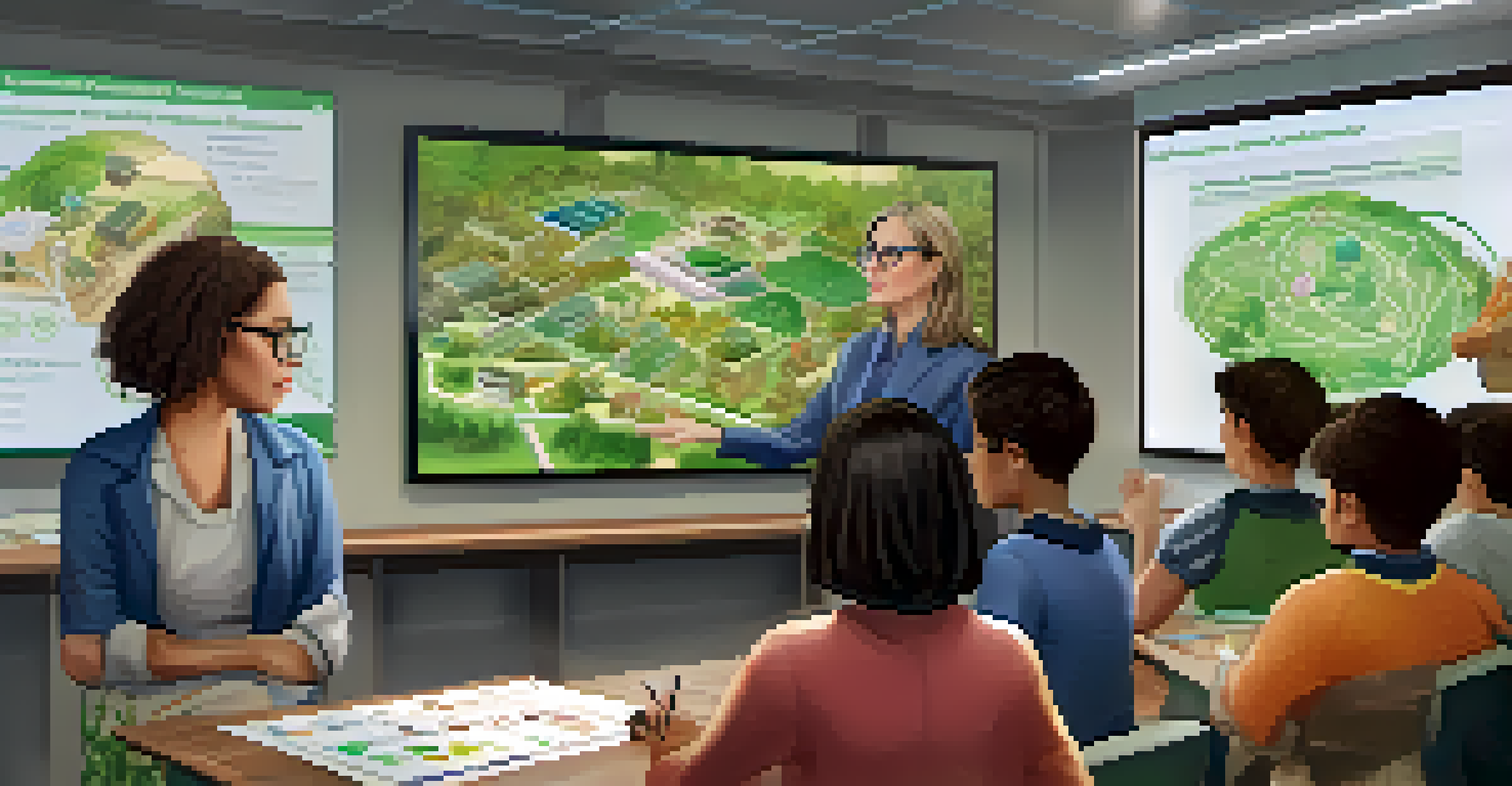Environmental Science and Ethics: A Combined Curriculum

Understanding Environmental Science and Its Importance
Environmental science is a multidisciplinary field that studies the interactions between the natural environment and human society. It encompasses areas such as ecology, geology, meteorology, and biology to understand how human activities impact the planet. An understanding of this field is crucial for addressing contemporary challenges like climate change, pollution, and biodiversity loss.
The greatest threat to our planet is the belief that someone else will save it.
By studying environmental science, students gain insights into the intricate systems that sustain life on Earth. This knowledge empowers them to make informed decisions and advocate for sustainable practices. The urgency of environmental issues in today’s world makes this subject not just relevant, but essential for future generations.
Moreover, environmental science encourages critical thinking and problem-solving skills. Students learn to analyze data and model complex systems, which are vital skills in various career paths. This foundational knowledge sets the stage for integrating ethical considerations into environmental decision-making.
The Role of Ethics in Environmental Science
Ethics in environmental science involves examining moral principles and values related to human interaction with the environment. It addresses questions about what is right and wrong when it comes to resource use, conservation, and environmental justice. Understanding these ethical dimensions is vital for fostering responsible stewardship of our planet.

One key concept in environmental ethics is the idea of intergenerational equity, which emphasizes the responsibility of the current generation to protect the environment for future generations. This principle challenges us to consider the long-term consequences of our actions, rather than focusing solely on short-term gains.
Environmental Science's Vital Role
Understanding environmental science is essential for addressing urgent global challenges like climate change and pollution.
Additionally, incorporating ethics into environmental science encourages a holistic view of ecological systems. It pushes students to think beyond mere scientific facts and consider the social, economic, and cultural implications of environmental issues, leading to more comprehensive solutions.
Benefits of a Combined Curriculum
Integrating environmental science and ethics into a single curriculum offers numerous benefits for students. This combined approach allows learners to develop a more nuanced understanding of environmental issues, as they learn not only the science behind them but also the ethical implications. This holistic perspective can enhance critical thinking and decision-making skills.
We won’t have a society if we destroy the environment.
A combined curriculum also fosters interdisciplinary collaboration, encouraging students from different backgrounds to work together. This diversity of thought can lead to innovative solutions that address complex environmental challenges. For example, a project might involve scientists, ethicists, and community activists collaborating to develop sustainable practices.
Moreover, this integrated approach prepares students for a variety of career paths, from environmental law to conservation biology. With a strong foundation in both science and ethics, graduates will be better equipped to navigate the multifaceted challenges of the modern world.
Examples of Integrated Curriculum Models
Several educational institutions have successfully developed integrated curricula that combine environmental science and ethics. For instance, some universities offer courses that explore the ethical implications of climate change, allowing students to engage with real-world issues while considering moral responsibilities. These courses often include case studies, group discussions, and community projects.
Another example is the use of project-based learning, where students tackle local environmental issues while incorporating ethical considerations. For example, a team might work on a project to assess the impact of pollution in their community, weighing the scientific findings against social justice concerns and community needs.
Importance of Ethics in Education
Integrating ethics into environmental science education fosters responsible stewardship and long-term thinking about our planet.
Such models not only enrich students' learning experiences but also empower them to take action in their communities. They develop practical skills while understanding the ethical dimensions of their work, creating a new generation of environmentally conscious leaders.
Challenges of Implementing a Combined Curriculum
While the benefits of a combined curriculum are clear, there are challenges to its implementation. One significant hurdle is the need for educators who are well-versed in both environmental science and ethics. Finding instructors with expertise in these areas can be difficult, especially in regions where resources are limited.
Additionally, curriculum development can be complex, as it requires careful alignment of learning objectives across disciplines. Educators must create a cohesive framework that allows for seamless integration of scientific concepts and ethical discussions, which can be a time-consuming process.
Finally, there may be resistance from traditionalists who favor a more segmented approach to education. Overcoming these barriers involves demonstrating the value of an interdisciplinary perspective and showcasing successful examples of integrated curricula that lead to impactful outcomes.
The Future of Environmental Education
As we look toward the future, the importance of environmental education that includes ethical considerations will only grow. With pressing global challenges such as climate change and resource depletion, it is essential for future leaders to be equipped with both scientific knowledge and ethical reasoning. This dual focus will enable them to create and implement effective solutions.
Moreover, as public awareness of environmental issues continues to rise, there is an increasing demand for educational programs that reflect this complexity. Schools and universities that adopt integrated curricula will likely attract students who are passionate about making a difference, positioning themselves as leaders in environmental education.
Benefits of an Integrated Curriculum
A combined curriculum enhances critical thinking and prepares students for diverse career paths by merging scientific knowledge with ethical considerations.
Ultimately, the future of environmental education hinges on our ability to adapt and innovate. By embracing a curriculum that combines environmental science and ethics, educational institutions can cultivate informed citizens who are prepared to navigate the complex challenges facing our planet.
Conclusion: A Call to Action
In conclusion, merging environmental science with ethics in education is not just beneficial; it is essential in today’s world. This combined curriculum fosters a deeper understanding of the environmental challenges we face and empowers students to think critically about their role in addressing these issues. By equipping learners with both scientific knowledge and ethical frameworks, we can inspire a generation of environmentally responsible leaders.
Now is the time for educational institutions to embrace this integrated approach and develop curricula that reflect the interconnectedness of science and ethics. Educators, policymakers, and communities must work together to create opportunities for students to engage with these critical topics.

As we move forward, let us prioritize education that not only informs but also inspires action. Together, we can cultivate a more sustainable future through a combined understanding of environmental science and ethics.